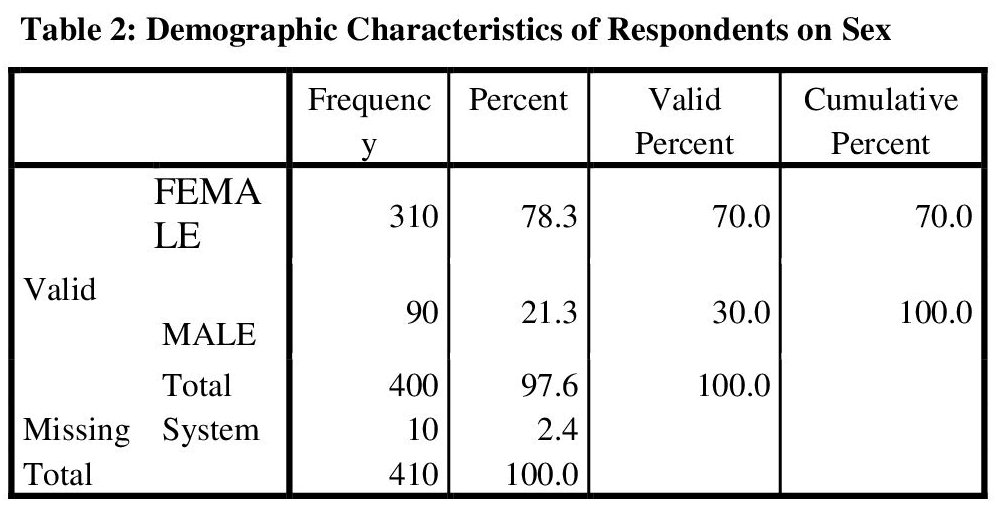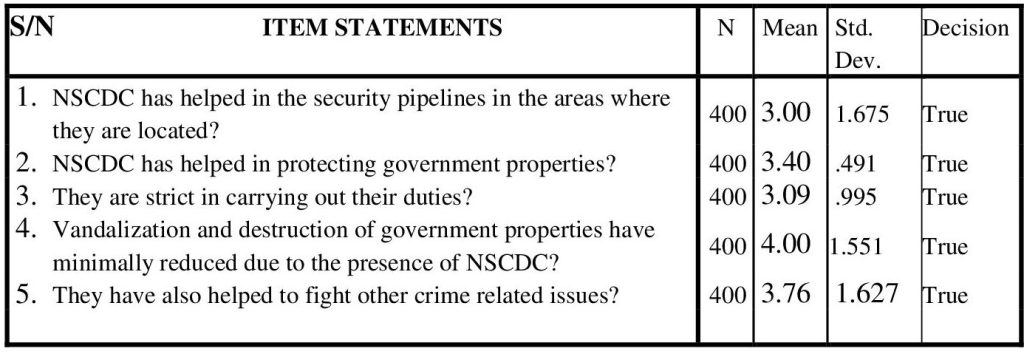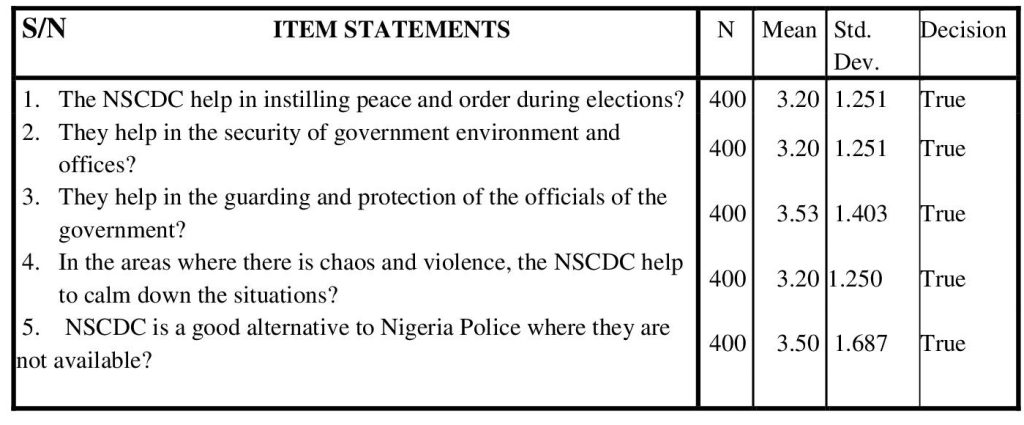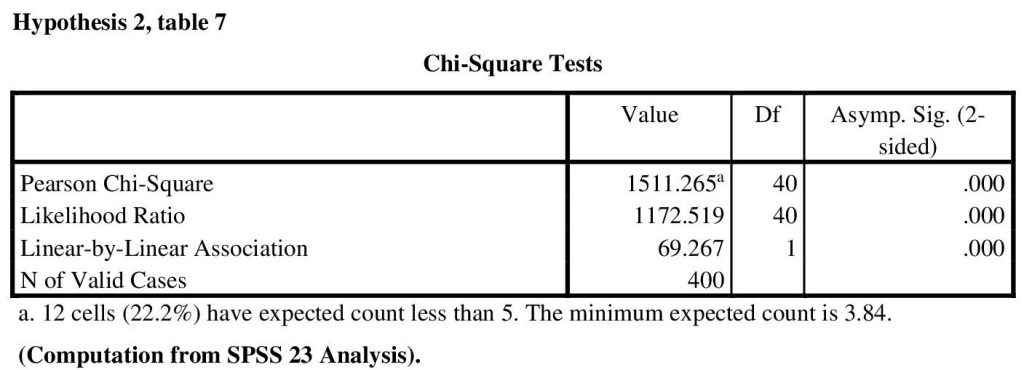|
International Journal of General Studies (IJGS), Vol. 2, No. 3, October-December 2022, https://klamidas.com/ijgs-v2n3-2022-10/ |
||
|
Security Agencies and Internal Security Administration: Evaluation of Nigerian Security and Civil Defense Corps, Anambra State (2011-2018) By Obiora Anthony Uzor, Obinna Solomon Eboh, Angela Ukamaka Umeasiegbu & Ifeamaka D. Okafor*
Abstract This paper is an examination and evaluation of the operation of Nigerian Security and Civil Defence Corps (NSCDC) in Anambra State, Nigeria. The study covers a period of seven years, 2011 to 2018. The methodology guiding the paper is survey design as the study relied on both primary and secondary sources for data generation. However, the results of the study indicated that: the establishment of the Nigerian Security and Civil Defense Corps has significantly helped in the amelioration of pipeline vandalization in Nigeria. It has indeed reduced pipeline vandalism and they have a number of cases of their successful operation against such vandals. This area and their surveillance roles in different segments of civil society constitute some of the praise-worthy roles of the Nigerian Security and Civil Defense Corps. This study indicates that the creation of the Nigerian Security and Civil Defense Corps has significantly helped in crime reduction and in stabilizing the social order in Anambra State and some other states of Nigeria. Based on the findings, it is recommended that the NSCDC should, when needful, undertake joint security exercises or programmes with some stake-holders in the various communities. Such cooperative effort would enable the NSCDC to reach out to the people in need of help. Another recommendation stresses the need to enact a vagrancy law which would serve as the legal instrument upon which the NSCDC can take preventive action against vagrants who may be potential sources of criminality. Keywords: evaluation, security agencies, internal security, administration, civil defence, vandalism, Anambra State Introduction The security of lives and property, the maintenance of law and order and sustainable development are some of the duties of the state to its citizenry; they help in ensuring a peaceful environment within which individuals, communities and legitimate businesses can flourish. Without security, it is difficult for any society to make progress in any sector. Without security, even peaceful co-existence is co-existence is hindered. This is why any responsible government does everything to secure its polity, ensure the safety of its people and create and maintain an enabling environment for a just and prosperous society (Omah, 2013). This is the primary goal of every reasonable leader or administration. In the past few years, Nigeria has witnessed several cases of insecurity in almost every area of its national life, ranging from communal and religious crises to disruption of business operations due to the activities of disgruntled youths. The precarious security situation, at some point, seemed to have negatively affected our relationship with other nations, leading to reduced foreign investment in the country. The country’s security profile was worsened by kidnapping, terrorism, vandalization of oil pipe-line, insurgency, and armed robbery. This paper examines the role of the Nigerian Security and Civil Defence Corps (NSCDC) in internal security management of Anambra State, Nigeria, from 2011 to 2018. According to Clifford (1974), crime prevention refers to the measures by law enforcement agents or institutions to prevent the commission of crime or reduce it to a minimal level. This definition addresses both crime and its impact on individuals and society as well as the measures to combat the menace of crime. He went further to argue that crime prevention entails any action designed to reduce the level of crime and or perceived fear of crime. Moreover, crime can also be prevented by not only the law enforcement agencies or institutions, but by private individuals themselves when they report suspects to authorities concerned for investigations. Even with the presence of the Nigerian Security and Civil Defense Corps (NSCDC), the issue of crime kept on deteriorating by the day. The Nigerian Security and Civil Defense Corps tried every paradigm within their power to ensure that crime was reduced, but the situation seemed obstinate. It is also believed that the Nigeria Police Force has put-in a lot of energy in their efforts to protect the lives and properties of the citizens prior to and even after the emergence of the Nigerian Security and Civil Defense Corps which was created to assist the police, all to no avail. This security quagmire constitutes the focus of this paper which is restricted to evaluation of the operations of the NSCDC in Anambra State within the earlier-stated period. Objectives of the Study The objective of the study is to assess the impact of Nigerian security and civil defence corps on internal security management in Nigeria. Specifically, the study seeks:
Conceptual Review Security Agencies The word security has been interpreted differently by different scholars and observers. According to Nweke (1999), national security means guidance against internal and external threats, regime maintenance, achievement of an acceptable level of economic viability, in short, national security primarily means all those things that lead to the safety of lives and property of people living within a geographical location. Security agents provide security for the nation. The quest to make the environment safe and secure for every Nigerian is a desired development. Akinjide (1982) defines Nigerian security thus: The maintenance of the Federal Republic of Nigeria and its organs as by law established. So that any threat to the corporate existence of Nigeria or any arm of government duly set up by the constitution should be seen as a threat to public security. Equally any threat to the economic and social structure of Nigeria such as conflicts, sabotage of our national resources i.e., oil, water, electricity, e.t.c amount to undermining Nigeria’s public security. This definition appears to be legislative, but we argue that any definition of Nigerian security will be meaningless if it fails to include the security of the aggregate people within the country. In fact the Nigerian constitution clearly defined Nigerian security from the perspective of the people when it states that “sovereignty belongs to the people of Nigeria from whom government derives all the powers and authority”, adding that “the security and welfare of the people shall be the primary purpose of government”. Abba (1996:34) argue that Nigerian security means: The protection of the lives, rights of the citizens and resources, territory, sovereignty and lawful institution of the country only in so far as these institutions are utilizing the resources of the nation for the provision of secure, just and equitable living conditions for all the citizens of the country. The substance of this definition is that anything that threatens the lives of citizens, their dignity, their property, resources, territory, sovereignty and lawful institutions of Nigeria is a security risk. It therefore goes to suggest that Nigerian security is guaranteed when these factors are free from danger. It then becomes obvious that there are issues or problems both internal and external that are likely to affect the security of Nigeria. From these we can deduce that Nigeria’s security could mean the survival of the Nigerian state, its components and the lives and property of the people living within its territory. By security agents we mean all the personnel responsible for the security of the country, such as the police, military, state security service (SSS), para-military organization, etc. To Abba (1996:23), every citizen is supposed to be security conscious and alert. That means security should not be left to security agents alone. But whether this is the case or not is beyond the purpose of this paper, since we are more concerned with the role of NSCDC security agents and their contribution to economic development of the Nigerian nation. According to Nweke (1999:58), security agents are those officers and personnel on active duty or those who watch against threats to internal and external peace and unity of a country. To him, security is a serious business and, as such, every government invests in security to protect the peace and stability of its society. The role of the various security agents, including NSCDC operatives, enhances the people’s peace of mind and gives them the confidence they need to invest in the economy, create wealth and contribute to the progress and development of the country (Garuba, 1997). The economy cannot boom in an insecure environment. A peaceful polity generates a feeling of happiness and general public contentment. These attract investment to the country. No investor would want to invest in a troubled and conflict-infested society. Nigeria has been experiencing bomb blasts for the past few years in some parts of the country. These situations surely will not boost investors’ confidence or the confidence of the general public at all. That is why the role of the NSCDC and other security agents in providing security for the country cannot be over emphasized. If an environment is well policed and secure or free from security crisis it tends to bring about economic development. This is because no society can develop where there are violence and constant threats to peace and stability (Gameni, 1990). Internal Security Administration in Nigeria The 1999 constitution of the Federal Republic of Nigeria affirms the Nigerian state as one indivisible and sovereign state made up of thirty-six states and a Federal Capital Territory (FCT), Abuja. The country is a federation and operates the presidential system of government. Governments all over the world are accountable for the provision of security for its citizens. They endow security agencies with instruments and mechanism of state power that are backed-up by enabling laws (Phenson, 2014). The constitution, for instance, outlines the role of the federal government and the roles of other tiers of government in security provision and management. Such power sharing is better explained by the concept of separation of power promoted by Montesquieu and by the social contract theory whereby individuals surrender their sovereignty to government while government undertakes to protect lives and property. In addition, the concept of federalism (Nigeria being a federal state) also advocates power devolution from the centre (federal) to component units (states and local government areas). With the constitutional provisions, the responsibility to manage the country’s security is that of the Nigerian state. All over the world, provision of security to guaranty the protection of lives and property of citizens, welfare and rights of the citizenry have always been the statutory function of any responsible government. In the same vein, Nigerian state and all its component units have the statutory and primary duty to guaranty the welfare of its citizens. In doing this, governments evolve suitable policies and actions for the enhancement of a peaceful and tranquil atmosphere for human activities to thrive. This make governments to receive demands from citizens of the state concerning a great variety of services related to, for instance, law and order, defense and security (Agi, 2003). Consequently, the Niger-Delta people have made several demands for environmental security, infrastructural development, equal sharing of crude oil resources, job employment opportunities, etc. The use of military forces, in some cases, to suppress the genuine demands of the Niger-Delta people has raised a question mark on the good will of the federal government of Nigeria. Though the concept of national security, according to Nnoli (2006), has been closely associated with military might, it is only proper to use such power to ward off the power of other states and consequently safeguard the state, its population and their cherished values. Security is not using military force or hardware against the people. Supporting the above standpoint, Art (2001) observes that the state can use military might to suppress the anarchic nature of international political environment in which states exist, adding that states must first and foremost be concerned with their security, the extent which the people feel not threatened by the actions of another state. A concern for survival thus breeds a pre-occupation with security. The above assertion was also supported by Collins (2007:15) who said: “one of the basic responsibilities of a state is to work to sustain security against external and internal threats and the components of state security including: safety, autonomy, development and rule”. In his contribution, Ekpe (2007) observes that it is in an attempt to reduce to the barest minimum threats that the government comes in to provide the shield. “The government does this, not only by maintaining law and order, but also through its constitution and the criminal codes which elaborately spell out penalties for those who break the law”. Among influential political philosophers, Thomas Hobbes argued most strenuously that safety from harm constitutes the chief jurisdiction for a government’s existence. Hobbes was not alone in this contention. Aristotle also emphasized that the first goal of political life was the protection of life itself. The Impact of Nigerian Security and Civil Defense Corps on the Prevention against Pipeline Vandalization of Government Property in Nigeria Nigeria is regarded by the external world as a nation with tremendous potential. Its distinguishing characteristics place it high in the community of nations. Nigeria is the most populous nation in Africa, it is the largest black nation and this fact is critical for Nigeria. By virtue of its large population and the amount of economic resources it is capable of mobilizing, Nigeria should be able to ensure the existence of sustained peace, tranquility and security in the country (Joy, 1989). Section 3(1) (f) (i) of the NSCDC Act (Amendment Act 2007 being lucid and unambiguous expressly conferred on the NSCDC the authority to investigate offence of oil pipeline vandalism and to initiate proceedings thereto on behalf of the Attorney General of the Federation. This means that even though the Nigeria Police Force (NPF) may apprehend any person suspected to have committed the offense of pipeline vandalism, it is the responsibility of the NSCDC to prosecute such a suspect and not the responsibility of the Nigeria Police Force. The rising concern regarding the prosecution of offenders is that women and children are also involved in pipeline vandalism. The Nigeria Security and Civil Defence Corps is expected to make necessary provision that would take care of juvenile vandals as it carries out its duty of prosecuting the vandals (Uzondu, 2012). The Impact of Nigerian Security and Civil Defense Corps on Social Orderliness in Nigeria The Nigeria Security and Civil Defence Corps roles were specified and demarcated from those of the police, the paramilitary agencies and the army, navy and the air force to prevent duplications of duties and responsibilities. Since the formation of the corps, it has performed tremendously in the area of crime prevention. Chidozie (2009) observes that Nigeria Security and Civil Defence Corps have recorded a significant achievement and commitment in discharging their duties without arms. According to him, Nigeria Security and Civil Defence Corps has done satisfactory work in the area such as escort/public security of well-meaning Nigerian and foreigners, carrying out anti-vandalization, arresting and prosecuting of vandals, restoration of riot and conflict areas among others. For instance, Master web (May 31, 2012) reports that officials of the Nigeria Security and Civil Defence Corps (NSCDC) Abia Command arrested seven persons (six men and one lady) for adulterating multiple products. According to master web the multiple products include finished manufacturing equipment and others at various stages in the adulteration process. Substantiating further, Oche (2006) opines that the Nigeria Security and Civil Defence Corps has done well in providing security during elections in the federal capital territory during the April 10th 2010 elections in the six area council. In the view, Nkanga (2009) postulates that Nigeria Security and Civil Defence Corps is saddled with the responsibility of monitoring and supervising the activities of the private guard companies in Nigeria. He further maintained that the charter aims at publishing among other things requirements for renewal grievance redress mechanism among others. Any organization or persons who did not renew its license will be sealed off. In Ondo state, men of the Nigeria Security and Civil Defence Corps sealed five companies in Akure, which did not register with the command (Oche, 2006). Methodology The study adopted cross-sectional survey design. The area of the paper is Nigeria Security and Civil Defence Corps in Anambra State. The population is the total staff strength of Nigerian Security and Civil Defence Corps Anambra State which is 400. Source: the admin officer (Inspector Iloegbunam Azuka), administrative department of Nigeria Security and Civil Defence Corps, Awka, Anambra state. Data were obtained through primary and secondary sources. The data collected by administering the research instrument were analyzed in line with each research questions and hypothesis. Descriptive statistics including table frequencies, percentages, and charts were used in the study. Also, data collected from the respondents were collated and analyzed. The research questions were answered using the mean scores and standard deviations from the analyzed data. The hypotheses were tested using chi-square through SPSS version 23.0. The hypotheses were tested at 0.05 level of significance. Data Presentation and Analysis Demographic Characteristics of Respondents
Source: Field survey, 2022 In classifying the respondents by their age distribution in the above table, it was gathered that 280 (68.3%) were 25-50 years and 120 (29.3%) were 51-70 years.
The table above shows that 310 of the respondents which is 78.3% were females, while 90 of the respondents amounting to 21.3% were males. This result automatically x-rays that there were more females than males in the field than male participants. Data on Variables of Subject under Investigation Research Question 1: Did the establishment of the Nigerian Security and Civil Defense Corps help to ameliorate pipeline vandalization of government property in Nigeria? The questionnaire items for this section are 1, 2, 3, 4 and 5. The responses to research question one is presented in table 3. Table 3: Respondents mean and standard deviation scores on whether the establishment of the Nigerian Security and Civil Defense Corps help to ameliorate pipeline vandalization of government property in Nigeria.
Source: Field Survey, 2022 (Computation from SPSS 23 Analysis). The result in table 3 shows that the respondents agreed with items 1, 2, 3, 4 and 5 as to whether the establishment of the Nigerian Security and Civil Defense Corps help to ameliorate pipeline vandalization of government property in Nigeria which means that every members of the participants was strongly behind the above notions. Research Question 2: Did the Nigerian Security and Civil Defense Corps instigate social order in Nigeria? The questionnaire items for this section are 6, 7, 8, 9 and 10. The responses to research question two is presented in table 4. Table 4: Respondents mean and standard deviation scores on whether the Nigerian Security and Civil Defense Corps instigate social order in Nigeria.
The result in table 4 above shows that the respondents agreed with the items 6, 7, 8, 9 and 10 as to whether the Nigerian Security and Civil Defense Corps instigate social order in Nigeria which means that every members of the participants was strongly behind the above notions. Test of Hypothesis The hypotheses testing involves a set rules that leads to a decision in the acceptance or rejection of a given phenomenon. The tool that is used here is Chi-square (x2). Chi-square is a method that measures the discrepancies existing between the observed and expected frequencies. Hypotheses One The establishment of the Nigerian Security and Civil Defense Corps did not significantly helped in the amelioration of pipeline vandalization in Nigeria. Using the information gotten from question 1,2,3,4 and 5 the hypotheses were tested. Hypothesis 1, table 6
From the Table above, the result showed that the establishment of the Nigerian Security and Civil Defense Corps significantly helped in the amelioration of pipeline vandalization in Nigeria. V (1,40)=1511.265, If p value < is less than 0.05, you reject the null hypotheses and accept the alternate hypotheses. It based on that decision rule that we accepted that the establishment of the Nigerian Security and Civil Defense Corps significantly helped in the amelioration of pipeline vandalization in Nigeria is accepted. Hypotheses Two The creation of the Nigerian Security and Civil Defense Corps significantly instigated social order in Nigeria. Using the information gotten from question 6,7,8,9 and 10 the hypotheses were tested.
From the table above, the result showed that the creation of the Nigerian Security and Civil Defense Corps significantly instigated social order in Nigeria. V (1, 40)=1511.265, If p value < is less than 0.05, you reject the null hypotheses and accept the alternate hypotheses. It is based on that decision rule that we accepted also that the creation of the Nigerian Security and Civil Defense Corps significantly instigated social order in Nigeria is accepted. Findings
Recommendations Based on the summary of findings, the following recommendations have been given:
References Abba & et al (1996). National security and foreign policy. London Rout ledge Akinjide, R. (1982). The nexus of national security in a developing society. Heinemann press Ltd Akpan, N.S. 2010. Kidnapping in Nigeria’s Niger Delta: An exploratory study, J Soc sci 24 (1):33-42. http://integritynigeria.org/wp-content/uploads/2012/07/Kidnapping-in-Nigeria%E2%80%99s-Niger-Delta-An-Exploratory-Study.pdf Journal of Political and Administration Studies, 2. Art, R. (2001). Security in the Oxford companion to politics of the World. Oxford University Press. Chidozie, E. (2009). Reasons to let Nigeria security and civil defense corps bear Arms: Master Web. Clifford, C (1974). New Beginnings, Retrieved from: www.cliffordchance.com/content/…/cliffordchance/…/new_beginning Collins, A. (2007). Contemporary security studies. Oxford University Press. Ekpe, A. (2007). State and economy: An introduction essay. Mac grace Academic Resources Publishers, Uyo. Gameni, C. (1990). An international development strategy for the 90s: Global stakes require new consensus in I.F.D.A. Dossier. Garuba, C. (1997) “Security in post-cold war era the need to break new grounds”. African Peace Review, Vol.1 No.1 April [7]. Joy, U. (1989). Annals of the social science council of Nigeria, (Number 2) University of Ibadan, Ibadan, Nigeria. McGraw-Hill Higher Education, New York. Nkanga, P. (2009): Civil defense to clamp down on foreigners in private security companies Nnoli, O. (2006). Security as protection of cherished core values of citizens. Forth Dimensions Publication, Enugu, Nigeria. Nweke G.A. (1999). African security in the nuclear Age. Fourth dimension publishers, Enugu Nigeria. Okeke, E. (2010).The challenges of governance in Nigeria: Broad perspectives and implications for the engineering practice a paper presented at the Engineering is Development Conference organized by the Association of Consulting Engineers of Nigeria (ACEN) Oche, O. (2006). From dispute to dialogue: Essays on conflict and conflict resolution. Lagos: FOG Ventures. Omah, E. (2013). Mechanism of conflict transformation: The nexus between conflict, security and development. In I. O. Albert & W. A. Ezelebor (Eds.), Managing security in a globalized world. Ibadan: John Archers Publishers. Phenson A. (2014). The Nigerian state, security management mandate and challenges in the Niger- Delta Region, Nigeria: Journal of Research & Method in Education 4(1), 2320–7388, Phenson, U. (2014). Government and the management of security challenges in Nigeria: A case of Akwa Ibom State (1999-2011). (Unpublished Ph.D Thesis) University of Uyo, Uyo, Akwa Ibom State, Nigeria. Prevention at your fingertips. Uzondu J. (2012). Civil defense: The challenge of bearing arms: From http://en.wikipedia.org/wiki/Civil_defence *About the Authors: Obiora Anthony Uzor (obiorauzor2@gmail.com), Obinna Solomon Eboh (ebohobinna1652@gmail.com), Angela Ukamaka Umeasiegbu, and Ifeamaka D. Okafor (ifehcoman@gmail.com) are affiliated to Chukwuemeka Odumegwu Ojukwu University, Igbariam Campus, Anambra State, Nigeria. |
||






